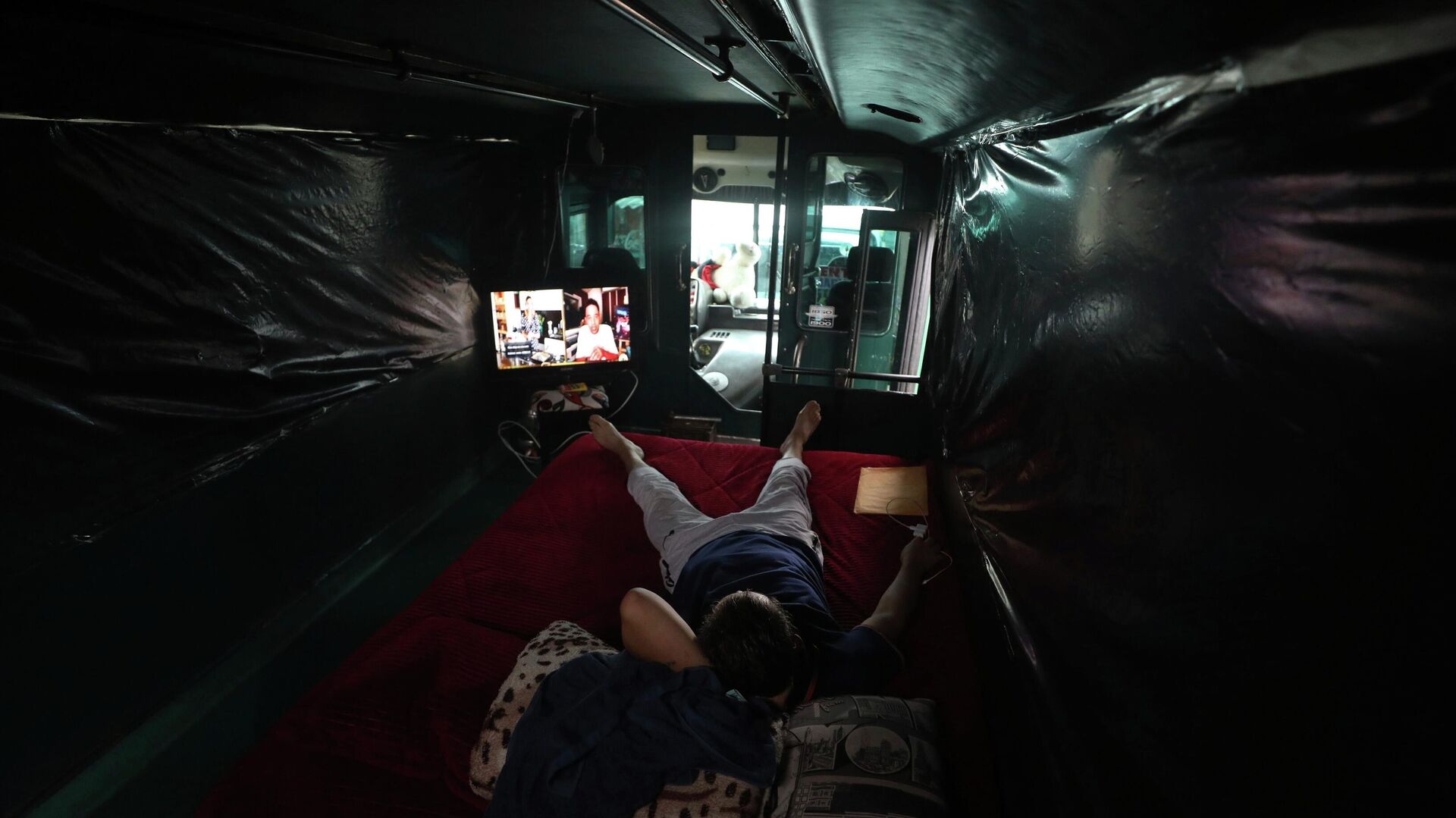https://sputnikglobe.com/20220629/from-early-death-to-obesity-snoozing-in-front-of-tv-can-trigger-numerous-heath-issues-study-warns--1096792654.html
From Early Death to Obesity: Snoozing in Front of TV Can Trigger Numerous Heath Issues, Study Warns
From Early Death to Obesity: Snoozing in Front of TV Can Trigger Numerous Heath Issues, Study Warns
Sputnik International
Previous sleep studies cited “legitimate concerns” over the “disruption” of sleep by ambient light as 36 percent of teens and 26 percent of adults typically... 29.06.2022, Sputnik International
2022-06-29T13:33+0000
2022-06-29T13:33+0000
2022-06-29T13:34+0000
sleep
television
obesity
https://cdn1.img.sputnikglobe.com/img/07e6/06/1d/1096792873_0:106:3269:1944_1920x0_80_0_0_2b1264d26356fa23cc4c94ba8269e5af.jpg
Falling asleep on the sofa while watching television - a habit customary for a great deal of people - is not as benign as it might seem, new sleep study has revealed.In fact, this practice, if indulged in often, could contribute to an early death, researchers at the Northwestern University School of Medicine in Chicago, Illinois have said.The study, Light at Night in Older Age, examined the health and sleeping habits of 552 people between the ages of 63 and 84. The focal point of the research was to determine the impact of ambient light, also called general lighting - the kind that provides overall illumination for a room - on sleeping people.The study showed that those who slept with even the slightest such lighting were more likely to suffer from diabetes, obesity and hypertension.Insulin Resistance at FaultThe reason for such a detrimental impact on health, according to the study, was insulin resistance.Insulin resistance is when a person’s cells, either in the muscles, fat, or liver, do not respond well to insulin and cannot properly utilize glucose from the blood for energy. This deficiency prompts the pancreas to create more insulin, which as a result, over time, triggers a reaction causing the blood sugar levels to rise.This particular condition is commonly associated with Type-2 diabetes, hypertension and cardiovascular disease, according to clinical journal, the American Family Physician.The study in question clarified that the insulin resistance was more likely to occur in the morning after people slept in a room with ambient lighting or the kind emitted by a TV set.Cited data showed that 17.8 percent of the study’s participants who slept with ambient light at night suffered from diabetes, as opposed to the 9.8 percent who opted to doze off in complete darkness.Another aspect in the study was obesity: some 40.7 percent of participants who snoozed without dimming the ambient light were obese. As for those who took their shut-eye in darkness, just around 26.7 percent were found to be obese.There were several other important factors revealed by the study that pointed to how health could be undermined by falling asleep in ambient light. For example, such individuals were more likely generally to have difficulty dozing off, and, accordingly, slept late the next day.Finally, the researchers have warned that it is not just TVs they are concerned about, as smartphones also cause distractions during the night. A 2019 Common Sense Media poll revealed that around 36 percent of teenagers and 26 percent of adults repeatedly wake up in the middle of their slumbers to check their mobile device.According to sleep experts, people are advised to put down their phone at least three hours before bedtime, to avoid the blue light emitted by the devices from “tricking the mind” into believing it is still daytime.
https://sputnikglobe.com/20220521/climate-change-is-causing-worldwide-sleep-loss-study-finds-1095677326.html
Sputnik International
feedback@sputniknews.com
+74956456601
MIA „Rosiya Segodnya“
2022
News
en_EN
Sputnik International
feedback@sputniknews.com
+74956456601
MIA „Rosiya Segodnya“
Sputnik International
feedback@sputniknews.com
+74956456601
MIA „Rosiya Segodnya“
sleep, television, obesity
sleep, television, obesity
From Early Death to Obesity: Snoozing in Front of TV Can Trigger Numerous Heath Issues, Study Warns
13:33 GMT 29.06.2022 (Updated: 13:34 GMT 29.06.2022) Previous sleep studies cited “legitimate concerns” over the “disruption” of sleep by ambient light as 36 percent of teens and 26 percent of adults typically wake up to check their mobile device at least once during the night.
Falling
asleep on the sofa while watching television - a habit customary for a great deal of people - is not as benign as it might seem, new sleep
study has revealed.
In fact, this practice, if indulged in often, could contribute to an early death, researchers at the Northwestern University School of Medicine in Chicago, Illinois have said.
The study, Light at Night in Older Age, examined the health and sleeping habits of 552 people between the ages of 63 and 84. The focal point of the research was to determine the impact of ambient light, also called general lighting - the kind that provides overall illumination for a room - on sleeping people.
The study showed that those who slept with even the slightest such lighting were more likely to suffer from diabetes, obesity and hypertension.
“People should do their best to avoid or minimize the amount of light they are exposed to during sleep,” the study's lead researcher, Phyllis Zee, warned in a statement to CNN.
Insulin Resistance at Fault
The reason for such a detrimental impact on health, according to the study, was insulin resistance.
Insulin resistance is when a person’s cells, either in the muscles, fat, or liver, do not respond well to insulin and cannot properly utilize glucose from the blood for energy. This deficiency prompts the pancreas to create more insulin, which as a result, over time, triggers a reaction causing the blood sugar levels to rise.
This particular condition is commonly associated with Type-2 diabetes, hypertension and cardiovascular disease, according to clinical journal, the American Family Physician.
The study in question clarified that the insulin resistance was more likely to occur in the morning after people slept in a room with ambient lighting or the kind emitted by a TV set.
“We are showing a mechanism that might be fundamental to explain why this happens… We show it’s affecting your ability to regulate glucose,” the experts highlighted.
Cited data showed that 17.8 percent of the study’s participants who slept with ambient light at night suffered from diabetes, as opposed to the 9.8 percent who opted to doze off in complete darkness.
Another aspect in the study was obesity: some 40.7 percent of participants who snoozed without dimming the ambient light were obese. As for those who took their shut-eye in darkness, just around 26.7 percent were found to be
obese.
There were several other important factors revealed by the study that pointed to how health could be undermined by falling asleep in ambient light. For example, such individuals were more likely generally to have difficulty dozing off, and, accordingly, slept late the next day.
“We know late sleepers also tend to have a higher risk of cardiovascular and metabolic disorders,” Zee was cited by CNN as saying.
Finally, the researchers have warned that it is not just TVs they are concerned about, as smartphones also cause distractions during the night. A 2019 Common Sense Media
poll revealed that around 36 percent of
teenagers and 26 percent of adults repeatedly wake up in the middle of their slumbers to check their mobile device.
According to sleep experts, people are advised to put down their phone at least three hours before bedtime, to avoid the blue light emitted by the devices from “tricking the mind” into believing it is still daytime.




